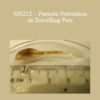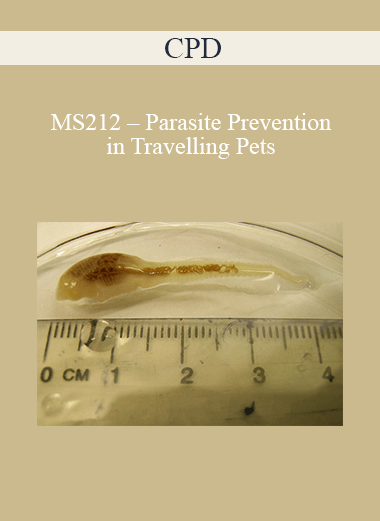$479.00 Original price was: $479.00.$114.00Current price is: $114.00.
 Purchase this course you will earn 114 Points worth of $11.40
Purchase this course you will earn 114 Points worth of $11.40Elevate your skills with the CPD – MS212 – Parasite Prevention in Travelling Pets course, available for just $479.00 Original price was: $479.00.$114.00Current price is: $114.00. on Utralist.com! Browse our curated selection of over 60,000 downloadable digital courses across diverse Everything Else. Benefit from expert-led, self-paced instruction and save over 80%. Start learning smarter today!
Purchase CPD – MS212 – Parasite Prevention in Travelling Pets courses at here with PRICE $479 $114
MS212 – Parasite Prevention in Travelling Pets
£347.00 (+VAT)
12 months access to recordings and course materials is included. Please note that these are webinar recordings and not live events. Full details on how to access the Mini Series will be emailed to you.
- Join Ian Wright – BVMS, MSc, MRCVS for three 2-hour online sessions
- Increased pet travel and importation of rescued dogs is leading to an associated increase in risk of exotic parasites and vectors establishing in the UK. The expanding distribution of a range of vector-borne diseases also makes it more likely that exotic parasites may be encountered while pets are on holiday abroad. It is vital that veterinary professionals are able to accurately advise clients in relation to pet travel based on the latest parasite distribution data to minimise health risks posed to both pet and owner. Vigilance in imported pets for relevant clinical signs and appropriate parasite diagnostic testing are also vital both for individual health and wider UK biosecurity.
- Comprehensive notes to downloaded
- Self-assessment quizzes to ‘release’ your 8 hours CPD certification (don’t worry, you can take them more than once if you don’t quite hit the mark first time)
- A whole year’s access to recorded sessions for reviewing key points
- Superb value for money – learn without travelling
- Watch the recordings on your iPad!
- This Mini Series was originally broadcast in February 2020
Programme
Legal aspects of pet travel post brexit
Legal aspects of pet travel post brexit, compulsory treatments and why they are important – Pet travel regulations post brexit and potential legal pitfalls, the compulsory treatments that are still in place and why they are important. Rabies and Echinococcus multilocularis will be covered and discussion of other possible compulsory treatment legislation including the tick treatment which was dropped.
What you’ll learn:
- The Potential pitfalls of pet travel documentation
- The compulsory treatment elements to pet travel and when they should be administered
- Why these treatments are important and the parasites they protect against
- Discussion of the pros and cons of other possible compulsory treatments such as the dropped tick treatment
A risk based approach to parasite prevention advice in the travelling pet
A risk based approach to parasite prevention advice in the travelling pet – preventative measures against Leishmania, ticks, heartworm and other vector-borne pathogens. Lifestyle, compliance and geography as factors in preventative treatment decision making will be considered as well as preventative measures that are not treatment based.
What you’ll learn:
- The preventative measures required against Leishmania, ticks, heartworm and other vector-borne pathogens
- Factors to consider when deciding which preventative treatments to apply such as lifestyle, compliance and parasite distribution
- Consideration of preventative measures that are not treatment based, their benefits and limitations
A practical approach to the imported rescue pet
A practical approach to the imported rescue pet – Clinical exam of the imported pet, selection of appropriate tests for parasitic infections, checking for ticks and identification and post importation treatments.
What you’ll learn:
- Areas to focus on and clinical signs to be aware of when examining the imported pet
- Selecting appropriate tests for parasite infections in imported pets
- Identification of ticks, where to send them for identification
- Post importation treatments and why they are important.
Purchase CPD – MS212 – Parasite Prevention in Travelling Pets courses at here with PRICE $479 $114
Cultivate continuous growth with the CPD – MS212 – Parasite Prevention in Travelling Pets course at Utralist.com! Unlock lifetime access to premium digital content, meticulously designed for both career advancement and personal enrichment.
- Lifetime Access: Enjoy limitless access to your purchased courses.
- Exceptional Value: Benefit from savings up to 80% on high-quality courses.
- Secure Transactions: Your payments are always safe and protected.
- Practical Application: Gain real-world skills applicable to your goals.
- Instant Accessibility: Begin your learning journey immediately after buying.
- Device Compatible: Access your courses seamlessly on any device.
Transform your potential with Utralist.com!
Related products
Everything Else
= 47 Points
Everything Else
= 37 Points
Everything Else
= 81 Points
= 89 Points
Everything Else
= 128 Points
Everything Else
= 31 Points
Everything Else
Brian Tracy – 21st Century Sales Training for Elite Performance
= 47 Points
Everything Else
= 52 Points
Login

 Purchase this course you will earn 114 Points worth of $11.40
Purchase this course you will earn 114 Points worth of $11.40










